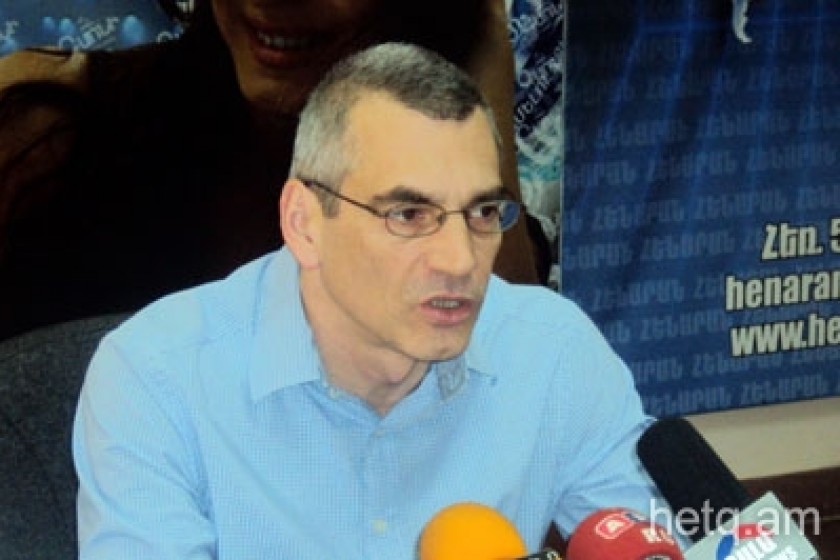Re: Regional geopolitics
Հայաստանը պետք է պատրաստ լինի Թուրքիայի կողմից Ցեղասպանության ճանաչման օրվան, որպեսզի ներկայացնի իր հստակ պահանջները
Մերի Մամյան
13:44, 20 ապրիլի, 2012
Այսօր լրագրողների հետ հանդիպման ժամանակ Տարածաշրջանային հետազոտությունների կենտրոնի ղեկավար, քաղաքագետ Ռիչարդ Կիրակոսյանը խոսեց Հայոց ցեղասպանության ընդունման քաղաքականության առանձնահակությունների մասին: Քաղաքագետն առանձանցրեց մի քանի հիմնական կետեր.
Հայաստանի արտաքին քաղաքականությունն այսօր գտնվում է ավելի ուժեղ դիրքերում: Միաժամանակ պետք է անել ավելին դիրքերնհ ամրապնդելու համար:
Աստիճանաբար դժվարանում է Թուրքիայի մերժման քաղաքականությունը, ավելի քիչ երկրներ են համաձայնվում Թուրքիայի հետ, և Թուրքիայի վարած մերժողական քաղաքականությունը դառնում է անարդյունավետ:
Ադրբեջանը շատ ավելի է ներգրավվում Հայոց ցեղասպանության մերժաման քաղաքականության մեջ: Մայիսի 1-ին Ադրբեջանը մեկ ասմով ղեկավարելու է ՄԱԿ-ի Անվտանգության խորհուրդը, որի ընթացքում Ադրբեջանի կողմից ակնկալվում են ավելի մեծ հարձակումներ Հայոց ցեղասպանության, ԼՂՀ և ՀՀ արտաքին քաղաքականության վրա:
Միջազգային հանրությունն ու միջազգային իրավունքը Հայոց ցեղասպանության հարցը կապում են այլ ցեղասպանությունների հետ` ավելի կարևորելով խնդիրը:
Քաղաքագետը Հայոց ցեղասպանության հարցը դիտարկեց նաև մաթեմատիկայի ոլորտում, որտեղ նա առանձնացրեց երեք էական թիվ` 100, 5 եւ 3: Մոտենում է Ցեղասպանության տարելիցի 100-ամյակը, որի ժամանակ կմեծանան ճնշումները Թուրքիայի վրա: 5 թիվը կապված է առաջիկայում խորհրդարանական ընտրություններին. խորհրդարանն ընտրվում է 5 տարի ժամկետով: Ըստ Կիրակոսյանին՝ հետաքրքրական է, որ ընտրություններին նախորդում և քարոզարշավի ժամանակահատվածում է ընդգրկվում նաև ապրիլի 24-ը: Սակայն այս ընթացքում քաղաքական ուժերը չեն խոսել Հայոց ցեղասպանության և հայ-թուրքական հարաբերությունների մասին: Այսինքն, Ռ. Կիրակոսյանի բնորշմամբ, ընտրությունները վերաբերում են անձերին, ոչ թե քաղաքականությանը: քաղաքագետի խոսքերով՝ 3 թիվը կապվում է այն հանգամանքի հետ, որ արդեն 3-րդ տարին է՝ հայերը Թուրքիայից սպասում են Հայոց ցեղասպանություն մասին հիշատակմանը:
Սակայն Հայցող ցեղասպանության հարցում առաջ է գալիս նաև մեկ այլ թիվ` 60 միլիարդը: Բանախոսի խոսքով՝ դա այն գումարն է, որը ՄԱԿ-ի հաշվարկներով Թուրքիան պետք է փոխհատուցի Հայաստանին:
Անդրադառանալով ՀՀ քաղաքականությանը՝ Ռ. Կիրակոսյանը նշեց, որ այստեղ կարևորվում է ԱՄՆ և նախագահ Բարաք Օբամայի դերը: Նա շեշտեց, որ ինքը ԱՄՆ-ի և ոչ թե ՀՀ-ի ժողովրդավարական կուսակցության անդամ է: Նա ԱՄՆ նախագահի աջակիցն է, բայց կարիք չունի, որ Օբաման արտասանի «ցեղասպանություն» բառը, ասի այն, ինչն ինքն արդեն վաղուց գիտի, առավել ևս, որ Հայոց ցեղասպանությունը վերապրած մարդու թոռ է: «Ցեղասպանություն» բառի օգտագործումն արդեն կապվում է ԱՄՆ-ի և ոչ ՀՀ բարոյականության հետ:
Սակայն այստեղ առաջ է գալիս Հայոց ցեղասպանության ճանաչման հարցը: Քաղաքագետի կարծիքով` կարևոր է հենց Թուրքիայի ներսում Ցեղասպանության ընդունումը, որը առաջ է գնում, բայց շատ դանդաղ: Ռ. Կիրակոսյանի կարծիքով` Հայաստանը պետք է պատրաստ լինի Թուրքիայի կողմից Ցեղասպանության ճանաչման օրվան, որպեսզի ներկայացնի իր կոնկրետ պահանջները: Դրա համար անհրաժեշտ է մշակել լուրջ ռազմավարություն:
Հայոց ցեղասպանության ճանաչման հարցը Թուրքիայի համար թե փորձություն է, թե հնարավարություն. նա կառերեսվի իր անցյալի հետ, կընդունի այն և կուղղորդվի, թե ինչպիսի երկիր պետք է լինի ապագայում:
Այժմ Թուրքիան հանդես է գալիս նոր նախաձեռնությամբ` ստեղծել իր սփյուռքը, ինչը նույն քաղաքականությունն է, որ տանում է Ալիևը Բաքվում: Ռ. Կիրակոսյանի բնորոշմամբ` Ալիևը կարծում է, որ իր երկրում ժողովրդավարական նորմերի և մարդու իրավունքների, ինչպես նաև բռնության դեպքերը բացահայտվում են հենց հայկական սփյուռքի միջոցով: Դա մի կողմից բացահայտում է սփյուռքի գործունեության արդյունավետությունը, մյուս կողմից պետք է պատրաստ լինել Ադրբեջանի և Թուրքիայի հարձակումներին:
Հայաստանը պետք է պատրաստ լինի Թուրքիայի կողմից Ցեղասպանության ճանաչման օրվան, որպեսզի ներկայացնի իր հստակ պահանջները
Մերի Մամյան
13:44, 20 ապրիլի, 2012
Այսօր լրագրողների հետ հանդիպման ժամանակ Տարածաշրջանային հետազոտությունների կենտրոնի ղեկավար, քաղաքագետ Ռիչարդ Կիրակոսյանը խոսեց Հայոց ցեղասպանության ընդունման քաղաքականության առանձնահակությունների մասին: Քաղաքագետն առանձանցրեց մի քանի հիմնական կետեր.
Հայաստանի արտաքին քաղաքականությունն այսօր գտնվում է ավելի ուժեղ դիրքերում: Միաժամանակ պետք է անել ավելին դիրքերնհ ամրապնդելու համար:
Աստիճանաբար դժվարանում է Թուրքիայի մերժման քաղաքականությունը, ավելի քիչ երկրներ են համաձայնվում Թուրքիայի հետ, և Թուրքիայի վարած մերժողական քաղաքականությունը դառնում է անարդյունավետ:
Ադրբեջանը շատ ավելի է ներգրավվում Հայոց ցեղասպանության մերժաման քաղաքականության մեջ: Մայիսի 1-ին Ադրբեջանը մեկ ասմով ղեկավարելու է ՄԱԿ-ի Անվտանգության խորհուրդը, որի ընթացքում Ադրբեջանի կողմից ակնկալվում են ավելի մեծ հարձակումներ Հայոց ցեղասպանության, ԼՂՀ և ՀՀ արտաքին քաղաքականության վրա:
Միջազգային հանրությունն ու միջազգային իրավունքը Հայոց ցեղասպանության հարցը կապում են այլ ցեղասպանությունների հետ` ավելի կարևորելով խնդիրը:
Քաղաքագետը Հայոց ցեղասպանության հարցը դիտարկեց նաև մաթեմատիկայի ոլորտում, որտեղ նա առանձնացրեց երեք էական թիվ` 100, 5 եւ 3: Մոտենում է Ցեղասպանության տարելիցի 100-ամյակը, որի ժամանակ կմեծանան ճնշումները Թուրքիայի վրա: 5 թիվը կապված է առաջիկայում խորհրդարանական ընտրություններին. խորհրդարանն ընտրվում է 5 տարի ժամկետով: Ըստ Կիրակոսյանին՝ հետաքրքրական է, որ ընտրություններին նախորդում և քարոզարշավի ժամանակահատվածում է ընդգրկվում նաև ապրիլի 24-ը: Սակայն այս ընթացքում քաղաքական ուժերը չեն խոսել Հայոց ցեղասպանության և հայ-թուրքական հարաբերությունների մասին: Այսինքն, Ռ. Կիրակոսյանի բնորշմամբ, ընտրությունները վերաբերում են անձերին, ոչ թե քաղաքականությանը: քաղաքագետի խոսքերով՝ 3 թիվը կապվում է այն հանգամանքի հետ, որ արդեն 3-րդ տարին է՝ հայերը Թուրքիայից սպասում են Հայոց ցեղասպանություն մասին հիշատակմանը:
Սակայն Հայցող ցեղասպանության հարցում առաջ է գալիս նաև մեկ այլ թիվ` 60 միլիարդը: Բանախոսի խոսքով՝ դա այն գումարն է, որը ՄԱԿ-ի հաշվարկներով Թուրքիան պետք է փոխհատուցի Հայաստանին:
Անդրադառանալով ՀՀ քաղաքականությանը՝ Ռ. Կիրակոսյանը նշեց, որ այստեղ կարևորվում է ԱՄՆ և նախագահ Բարաք Օբամայի դերը: Նա շեշտեց, որ ինքը ԱՄՆ-ի և ոչ թե ՀՀ-ի ժողովրդավարական կուսակցության անդամ է: Նա ԱՄՆ նախագահի աջակիցն է, բայց կարիք չունի, որ Օբաման արտասանի «ցեղասպանություն» բառը, ասի այն, ինչն ինքն արդեն վաղուց գիտի, առավել ևս, որ Հայոց ցեղասպանությունը վերապրած մարդու թոռ է: «Ցեղասպանություն» բառի օգտագործումն արդեն կապվում է ԱՄՆ-ի և ոչ ՀՀ բարոյականության հետ:
Սակայն այստեղ առաջ է գալիս Հայոց ցեղասպանության ճանաչման հարցը: Քաղաքագետի կարծիքով` կարևոր է հենց Թուրքիայի ներսում Ցեղասպանության ընդունումը, որը առաջ է գնում, բայց շատ դանդաղ: Ռ. Կիրակոսյանի կարծիքով` Հայաստանը պետք է պատրաստ լինի Թուրքիայի կողմից Ցեղասպանության ճանաչման օրվան, որպեսզի ներկայացնի իր կոնկրետ պահանջները: Դրա համար անհրաժեշտ է մշակել լուրջ ռազմավարություն:
Հայոց ցեղասպանության ճանաչման հարցը Թուրքիայի համար թե փորձություն է, թե հնարավարություն. նա կառերեսվի իր անցյալի հետ, կընդունի այն և կուղղորդվի, թե ինչպիսի երկիր պետք է լինի ապագայում:
Այժմ Թուրքիան հանդես է գալիս նոր նախաձեռնությամբ` ստեղծել իր սփյուռքը, ինչը նույն քաղաքականությունն է, որ տանում է Ալիևը Բաքվում: Ռ. Կիրակոսյանի բնորոշմամբ` Ալիևը կարծում է, որ իր երկրում ժողովրդավարական նորմերի և մարդու իրավունքների, ինչպես նաև բռնության դեպքերը բացահայտվում են հենց հայկական սփյուռքի միջոցով: Դա մի կողմից բացահայտում է սփյուռքի գործունեության արդյունավետությունը, մյուս կողմից պետք է պատրաստ լինել Ադրբեջանի և Թուրքիայի հարձակումներին:




Comment